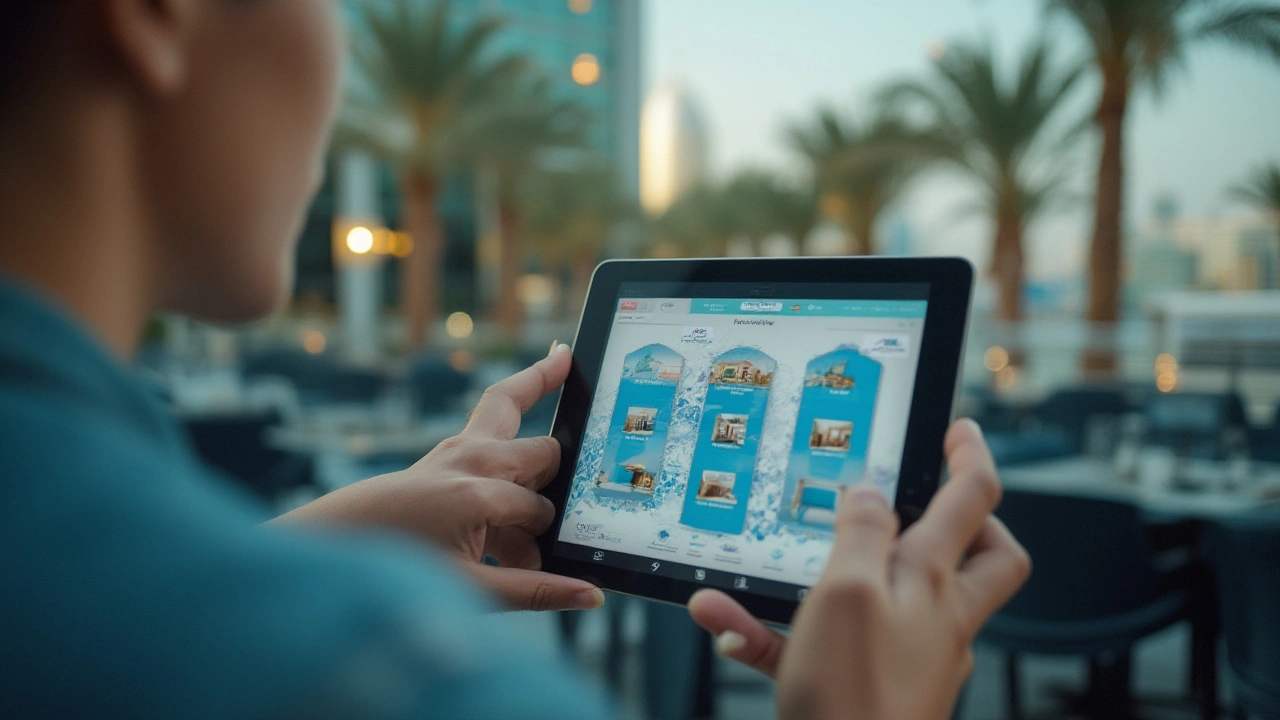You’re planning a trip to Dubai, and your finger’s hovering over the “book now” button—but is it for a hotel or an Airbnb? If you think this is a no-brainer, think again. Dubai has more five-star hotel rooms than London or New York, and its Airbnb scene keeps growing. Shockingly, in 2024, Dubai’s Airbnbs pulled in a record $1.2 billion in revenue—yes, billion—with properties ranging from Burj Khalifa view pads to dreamy desert villas. The city makes no secret of its love for luxury, but beyond the glitz, there are all sorts of surprises, rules, and real-life stories that shape how visitors experience their stay. One choice is more than just a bed for the night—it shapes your adventures, your wallet, and your memories.
The Hotel Experience: What Dubai’s World-Class Resorts Bring to the Table
Ask anyone about Dubai’s hotels, and expect to hear the word “luxury” thrown around a lot. There’s a reason: Dubai’s known for jaw-dropping resorts (think underwater suites at Atlantis The Palm) and sky-high skyscrapers with infinity pools that look like someone spliced a Bond movie with a five-star spa. You don’t need to splurge to catch a taste of the famous hospitality. Three-star and boutique hotels are rising in trendy neighborhoods like Al Seef, and some properties offer perks even at budget rates: think breakfast buffets, gyms, free shuttles, and lightning-fast Wi-Fi (two gigabit internet is pretty normal—Netflix addicts rejoice).
But what really sets Dubai hotels apart is service. Let’s be real—the UAE takes service seriously. Many hotels come with a concierge who will book tours, table reservations, doctors, you name it. Cleaning happens daily—sometimes more than once if you’re out—and security is tight. In 2023, Dubai’s Department of Economy and Tourism reported a guest satisfaction rating for hotels at 94%, one of the highest worldwide. You’ll rarely see shady operators because all hotels undergo strict government checks and licenses.
Now, here’s the fun part: in Dubai, even “regular” hotels can throw in crazy extras. Poolside ice cream carts, open-air movie nights under the stars—and don’t be shocked if robots deliver your room service. Want instant Instagram? Many properties offer free access to private beaches, waterparks, or exclusive lounges. Kids' clubs are standard in family-friendly hotels; business travelers can expect huge conference centers and private taxi fleets (meaning rides at your doorstep in minutes).
And then there’s location. Most hotels cluster around key hotspots like Downtown (close to Burj Khalifa and The Dubai Mall), Jumeirah Beach (for beaches and nightlife), and Business Bay (mainly business, but up-and-coming for foodies). You’ll usually be walking distance or a cheap taxi from major sights. Plus, hotel lobbies are often mini tourist hubs: tour desks, car rentals, currency exchanges, and even 24/7 stores can be found in-house, so you don’t need to stray too far, too soon.
Still, not everything’s roses. Peak season (November–March) sees room prices soar—sometimes triple what you’d pay in summer. There’s also the VAT (usually 5%) plus a tourism dirham ($2–$6 per night) slapped on your bill. Some resorts require hefty deposits or pre-payment. And while Dubai’s known for safety, guests have to stick to certain codes: public displays of affection, rowdy parties, and loud behavior aren’t really a thing in lobby bars, and unmarried couples may face awkward glances in a few, more conservative hotels (though most are relaxed these days, especially in the main tourist zones).
Quick tip: Booking direct with a hotel often nets you extra perks (free nights, late check-out), while aggregator sites might have better discounts but fewer benefits. If you love waking up to room service and pampering after a desert safari, Dubai’s hotels are hard to beat. But what if you want space and a more local vibe?
The Airbnb Angle: From High-Rise Penthouses to Desert Hideouts
The Airbnb boom hit Dubai later than Europe or America, but wow, has it made an entrance. As of June 2025, over 21,000 active Airbnb listings span Dubai, covering glassy apartments in Dubai Marina to quirky lofts down by the Creek. There are pros that make people swap hotels for Airbnbs—often for more personal space and a taste of “what it’s like to live here.” Ever wondered what morning sounds like on a palm-shaped island, or wanted to cook a homemade breakfast with Gulf views? This is your shot.
Let’s break down what you actually get. First, value for money. If you’re traveling in a group or as a family, it’s hard to top the math: a three-bedroom apartment on Airbnb might cost less than two hotel rooms, often with a private kitchen, living area, and even laundry. If you’re staying more than a few nights, Airbnbs often slash rates for week- or month-long stays—a big win for digital nomads or remote workers.
Privacy is another biggie. No knock-knock from housekeeping at 9:00am. No scrambling to get dressed when someone brings up towels. Many Airbnbs in Dubai are self-check-in, either using a coded lockbox or electronic keycard, so you can come and go at weird hours—great for late flights or spontaneous adventures.
Then there’s location variety. Sure, hotels hog the hot zones, but Airbnbs pop up in spots you’d never see otherwise—think old-school Deira, artsy Alserkal Avenue area, or right across from hidden beaches far from the crowds. It’s a way to get off the tourist treadmill and discover Dubai’s real neighborhoods, not just the polished brochure views.
But let’s talk legal stuff, because Dubai isn’t as Wild West with vacation rentals as some other cities. Landlords need a special license to operate legally, and new platforms—like Dubai’s official “Holiday Homes” directory—let you check if your booking is above board. Official Airbnbs should show a DTCM permit number on their listing. Book with unlicensed hosts, and your stay isn’t protected if authorities step in. This is rare, but worth double-checking by sending a direct message to the host about their registration.
As for service, adjust your expectations. No 24/7 concierge, no gym (unless your building offers it), and you’re typically your own cleaner unless you pay extra for a service visit. Many hosts do go above and beyond—a few leave local snacks, offer airport pickups, or send WhatsApp recommendations for brunch spots—but these touches aren’t universal.
Another watch-out: while Dubai is safe, using Airbnb means you become responsible for small but important details. Emergency? You’ll call the host, not a front desk. Lost your key at 2:00am? That’s your problem until the host answers. Also, some buildings restrict short-term rentals or don’t allow unmarried couples (especially outside main tourist districts), so always check policies ahead of time. Most apartments are “hotel-style,” but occasionally you’ll find real homes with quirks like low water pressure, delicate power sockets, or slow elevators.
Pricing can be a plus, but add-ons can sneak up. Cleaning fees, service charges, VAT, and sometimes “tourism fee” pop up on checkout. Unlike hotels, most Airbnbs require payment in full when booking, and cancellation policies can be strict.
Here’s a practical tip: If you arrive early or leave late, hotels will usually store your bags and let you kill time in the lounge. Most Airbnbs can’t. Pack light or plan for somewhere to stash your stuff while waiting for check-in or between flights. Hungry after a long day? Dubai’s grocery delivery apps (like Deliveroo and Instashop) are lifesavers for DIY diners. And yes, alcohol is legal for tourists, but it’s only sold in certain shops and restaurants—never assume your Airbnb comes stocked, unless the host says so!

Cost Comparison: Who Wins for Your Wallet?
Money talks, and in Dubai, your choice could seriously impact how much cash you have for wild activities—like ziplining over the Marina or splurging on gold-dusted coffee. Let’s break down the cold, hard costs.
| Accommodation Type | Average Nightly Rate (High Season) | Average Nightly Rate (Low Season) | Typical Add-Ons |
|---|---|---|---|
| Three-Star Hotel | $110 | $65 | Breakfast: $15, Tourism Fee: $3/night |
| Five-Star Hotel | $340 | $190 | Breakfast: $35, Tourism Fee: $6/night, Deposit: $200 |
| One-Bedroom Airbnb | $120 | $80 | Cleaning Fee: $30, VAT: 5% |
| Three-Bedroom Airbnb | $270 | $150 | Cleaning Fee: $70, VAT: 5% |
As you can see, at the high and low ends, prices overlap, but watch for the extras. Hotels usually package meals, spa deals, shuttle rides, and attractions into special deals—so you might end up saving if you plan to use them. Airbnbs look cheaper until you factor in cleaning fees and extra guest charges. Longer stays tip the scales in favor of Airbnb, thanks to weekly discounts (often up to 25–35%).
One sneaky difference: taxes. Dubai charges a “Tourism Dirham” on hotels but not always on Airbnb (depends whether the Airbnb is licensed as a “holiday home”—double-check!). Tipping isn’t required but is common for good service (5–10% usually covers it, in both hotels and Airbnbs).
When budgeting, think about “hidden” perks. Free parking? Many hotels in Downtown charge $15–$25 per night, but most residential Airbnbs include a spot. Going to Expo City or Global Village? Hotels sometimes offer shuttle buses, while with Airbnb you’ll need a taxi or rental car. And if you’re planning to cook, Airbnbs save loads on eating out, with supermarkets like Carrefour and Spinneys delivering straight to your door. One thing to keep in mind is water: Dubai tap water is technically safe, but most people (locals included) drink bottled—stock up at the start of your stay.
Location, Convenience, and That Dubai Lifestyle
If you picture Dubai as a city that’s all shiny glass towers and Formula 1 cars, you’re only seeing half the story. Picking the right base can decide whether you spend time sightseeing…or stuck in traffic. Dubai’s distances are notorious: a trip from Deira to Palm Jumeirah is a 40-minute taxi in good traffic. Metro is cheap and efficient (rides cost about $1–$3), but doesn’t cover beachfront areas or some villa districts.
Hotels rule the roost in places like Downtown Dubai, JBR (Jumeirah Beach Residence), and near the metro. These spots are ultra-walkable: step out from your lobby and you’re inside a mall, next to an aquarium, or a minute from taxis. If you’re in town for shopping festivals, concerts at Coca-Cola Arena, or big events like the Dubai World Cup, hotels make logistics a breeze.
Airbnb’s big draw is choice—you might land in the thick of Old Dubai markets or in a glittery new tower with your own pool. If you want to live like a Dubai expat, airbnbs can give you that home-away-from-home feel. Families love Airbnbs with big kitchens and space for kids to run wild; solo travelers might score a bargain studio with skyline views. But: check your building’s rules about guests and noise before you throw a party, as many towers have tight security and even curfews (especially in residential zones).
Dubai is obsessed with convenience, and both hotels and Airbnbs take this to heart. Guests get fast internet almost everywhere, laundry services (or in-unit washers), and access to ride-hailing apps like Careem and Uber. Navigating the city is much easier than it was five years ago, with English widely spoken and signs everywhere. But a funny thing: most Ubers and taxis can’t stop in small residential side streets—expect to walk a bit if you’re in an Airbnb in a warren-like area.
The “Dubai lifestyle” can mean brunches, evening fountain shows, and last-minute desert trips. Hotels score for ready-to-go activities: water sports desks, spa treatments, yoga classes, even free city tours. Airbnbs are less plug-and-play, perfect for independent types who’d rather hunt out the best local shawarma than join a hotel dinner buffet. But both offer a chance to soak up the city—and both give front row seats to its ever-changing skyline.
Traveling during Ramadan? Hotels adapt with special “Iftar” buffets and flexible meal timings, helpful for visitors. Many Airbnbs will leave a manual explaining what’s open and local customs—but if you’re on your own, do your research.

How to Decide: Matching Your Stay to Your Trip
So, hotel or Airbnb in Dubai? It really comes down to why you’re visiting, how you like to travel, and whether you want the polish of a staff-run hotel or the independence of a rented home. Here’s a cheat sheet to nudge you closer to the right choice:
- Dubai accommodation in hotels is great for short stays, business trips, pampered getaways, and anyone who craves location, service, and zero hassle.
- Airbnb is awesome for families, groups, anyone staying longer than a week, or travelers who prefer to self-cater and explore local neighborhoods.
- Travelers in town for events or luxury kicks should check hotel packages—because sometimes an added brunch, pool pass, or spa credit tips the scales.
- Budget watchers, digital nomads, and offbeat explorers usually do best in an Airbnb—just check the host is licensed and the location suits your plans.
- If you’re unsure: book a hotel for the first few nights (great for jetlag and easy airport-pickup) and switch to an Airbnb once you find your feet and know where you want to explore.
One final thing. No matter what you pick, Dubai is built for visitors—there’s Wi-Fi almost everywhere, English menus in most places, and endless ways to upgrade your stay. Whether you’re watching camels at sunrise, riding jet skis past the Burj Al Arab, or just chilling on a balcony high above Sheikh Zayed Road, the right base will make your story unforgettable. It isn’t about finding the fanciest room or the cheapest deal—it’s about what fits your adventure. Happy travels.
